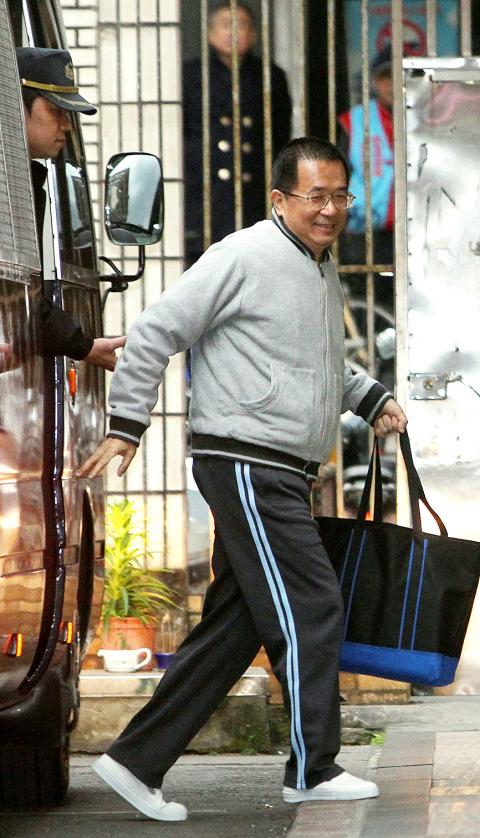The Supreme Court rejected an appeal on Thursday from the prosecutors’ office to seize more property belonging to former president Chen Shui-bian (陳水扁) and his immediate family in connection with several corruption cases.
The court said that nearly all the money in Chen’s Swiss bank accounts, totaling NT$700 million (US$23.8 million), had been remitted back to Taiwan and that should be enough to cover the fines demanded by the special prosecutor.
Spokesman Chen Hung-ta (陳宏達) said the court’s decision will not affect the seizure of property in connection with the two cases in which Chen has already been found guilty — involving a land deal and money for political favors.

Photo: CNA
Chen and his wife, Wu Shu-jen (吳淑珍), have been sentenced to 17-and-a-half years in prison in those two cases.
The special prosecutor had requested court approval to seize NT$48 million in fixed deposits, 37 shares with unknown value, two houses and seven lots of land in Taipei worth more than NT$200 million.
However, the Supreme Court ruled that the Chens owe the state NT$470 million, not the NT$980 million claimed by the special prosecutor. Given that about NT$700 million of the family’s overseas assets had been recovered, there was no need to make further seizures, it ruled.
Chen was transferred from a detention center on Dec. 2 to Taipei Prison in Taoyuan County, where he is now serving time.
Meanwhile, Wu was taken home from a prison hospital on Feb. 18, after Taichung Prison declined to admit her, saying that the wheelchair-bound Wu was not healthy enough to serve her sentence.
Kaohsiung Prosecutors’ Office has said in a statement that it will regularly send staff to Wu’s residence to determine whether her health has improved enough to enable her to begin serving her time behind bars.

Alain Robert, known as the "French Spider-Man," praised Alex Honnold as exceptionally well-prepared after the US climber completed a free solo ascent of Taipei 101 yesterday. Robert said Honnold's ascent of the 508m-tall skyscraper in just more than one-and-a-half hours without using safety ropes or equipment was a remarkable achievement. "This is my life," he said in an interview conducted in French, adding that he liked the feeling of being "on the edge of danger." The 63-year-old Frenchman climbed Taipei 101 using ropes in December 2004, taking about four hours to reach the top. On a one-to-10 scale of difficulty, Robert said Taipei 101

Taiwanese and US defense groups are collaborating to introduce deployable, semi-autonomous manufacturing systems for drones and components in a boost to the nation’s supply chain resilience. Taiwan’s G-Tech Optroelectronics Corp subsidiary GTOC and the US’ Aerkomm Inc on Friday announced an agreement with fellow US-based Firestorm Lab to adopt the latter’s xCell, a technology featuring 3D printers fitted in 6.1m container units. The systems enable aerial platforms and parts to be produced in high volumes from dispersed nodes capable of rapid redeployment, to minimize the risk of enemy strikes and to meet field requirements, they said. Firestorm chief technology officer Ian Muceus said

MORE FALL: An investigation into one of Xi’s key cronies, part of a broader ‘anti-corruption’ drive, indicates that he might have a deep distrust in the military, an expert said China’s latest military purge underscores systemic risks in its shift from collective leadership to sole rule under Chinese President Xi Jinping (習近平), and could disrupt its chain of command and military capabilities, a national security official said yesterday. If decisionmaking within the Chinese Communist Party has become “irrational” under one-man rule, the Taiwan Strait and the regional situation must be approached with extreme caution, given unforeseen risks, they added. The anonymous official made the remarks as China’s Central Military Commission Vice Chairman Zhang Youxia (張又俠) and Joint Staff Department Chief of Staff Liu Zhenli (劉振立) were reportedly being investigated for suspected “serious

Nipah virus infection is to be officially listed as a category 5 notifiable infectious disease in Taiwan in March, while clinical treatment guidelines are being formulated, the Centers for Disease Control (CDC) said yesterday. With Nipah infections being reported in other countries and considering its relatively high fatality rate, the centers on Jan. 16 announced that it would be listed as a notifiable infectious disease to bolster the nation’s systematic early warning system and increase public awareness, the CDC said. Bangladesh reported four fatal cases last year in separate districts, with three linked to raw date palm sap consumption, CDC Epidemic Intelligence